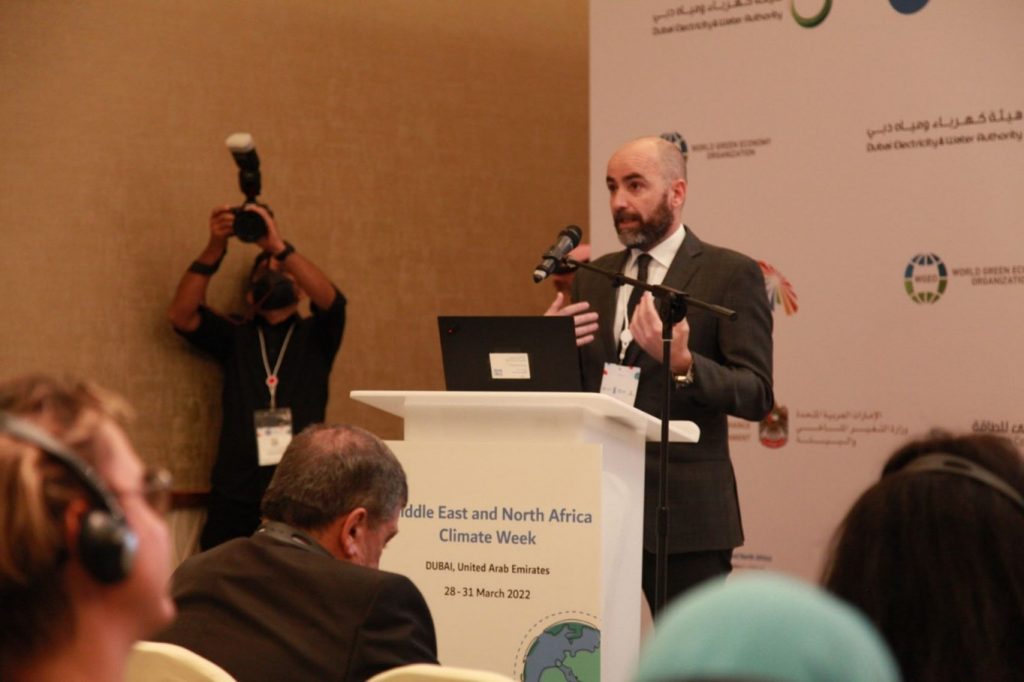First Middle East Climate Week opens opportunities to address regional climate change drivers
Recommendations from the first session
The Water Sector Lead of GCF and Chair of Water Security Bureau-IWRA, Dr Amjad, described the challenges of water and climate financing in the MENA region. He mentioned that the MENA region is underpricing water and water services, besides the long payback period of capital investment projects.
There is difficulty monetizing the benefits due to the poor business models. The region needs to maximize the value of existing water assets and attract more finance by supporting enhanced water conversation efficiency models.
There should be a focus on the Green Climate Fund, new technologies, and collaboration between water and other sectors. There is a need to assess the impact of the available policies in tracking mitigation benefits from economic diversification. Besides, the national policies and regulations should consider planning the transition from fossil fuel economies to the green economy.
The conference highlighted the need to develop climate finance strategies and set up regional priorities to push global climate finance toward the MENA region, including for water and WASH.
Second event
The second event, also held on 30 March, was entitled “Fortering Peace through Sustainable Water Future.” The session was co-convened by UNDP, SIWI and IFAD under Track 2: Integrated Approaches for Climate Resilient Development.
The objective of this session was to highlight the critical importance of considering climate security and the fragile contexts in which climate actions take place in the MENA region.
Currently, national determined contributions (NDCs) submitted under the Paris Agreement do not consider the conflicts or broader regional security aspects that may influence – and be influenced – by a country’s actions to address climate change.
Furthermore, water security is largely considered as a siloed approach under adaptation commitments in the NDCs. However, except for a for a small share of countries who commit to mitigation through actions on wastewater, water considerations did not figure into the formulation of mitigation commitments such as energy or agriculture – two sectors which consume an immense amount of water.
The session highlighted the importance of integrated approaches to climate action, water, peace and human security through a panel discussion comprising representatives from countries, international organizations and academia. The event increased awareness about these issues specifically in relation to financing, policy as well as governance and data capacities specifically in relation to operating in fragile or conflict contexts.
Financing
- Heavy lifting needs to be done by World Bank, other banks to identify priority investments such as irrigation. community management structures to decide on allocation of water. Providing more finance to developing countries including grants and highly concessional loans due to the risks that usually do not encourage private sector investment.
- Decentralized solutions are lacking – IFIs tend to focus on centralized solutions. Local interventions can help shift perceptions in a community.
- Regional mismatch of MDB offer of finance and financing needs for adaptation. Most of 70% of MDB finance focuses on mitigation. But countries need mainly finance for adaptation.
Policy
- There is a gap in understanding multi-dimension risks and stressors that hinder building adaptive capacity to climate change. So far, cross-sectoral cooperation for multi-dimensional risks is reactive and crisis-driven. There is a sharp reduction in institutional capacities to build adaptive capacities due to conflicts and displacement.
- Fragility and climate security contexts will be consideration in future UNFCCC COPs. Egypt COP27 will focus on adaptation and Africa with a climate security lens. Will build understanding with different actors about desired outcomes, easier access to finance, compliance mechanism for cooperation, cross-sectoral integration of strategies. Working with banks and financing institutions is key. COP28 to focus on climate security as well.
- Humanitarian agencies such as the Red Cross can make critical contributions to informing adaptation in fragile or conflict contexts. Too often, short-term humanitarian solutions are not addressing adaption. Red Cross pro-actively releases resources as soon as crises are predicted – and so can reach 2x as many people as during a crises.
Governance and Data Capacities
- We are late in assessing groundwater in the region – we need to change the governance and monitoring systems for groundwater to be able to manage it. In MENA, climate change has major impact on groundwater resources as drought and water shortage periods prolong. Linking policies and scientific research is very important for sustainable groundwater management, which can help bridge water demand during drought periods.
- Better data and regional action plans can enhance regional cooperation on transboundary water management. 60% of the water in MENA comes from outside the region National NDCs need to be bridged for regional resilience issues.
- It is important that decision-making is not merely a political or economic decision, but that the scientific point of view is included in order to promote long-term sustainability. Science and data are important for collaboration – peace actors to think about environmental aspects, lack of sustainability, lack of environmental data when access is not allowed. Environmental peace-building builds trust.
Operating in fragile or conflict-contexts
- In Yemen, Sustainable Fund for Development (SFD) is accepted by all parties in the country, is neutral and the only development vehicle operating in this difficult conflict setting. Food and water security should be the starting point, as without them there are no climate adaptation and no peace.
Key takeaways from the second session:
- We need to change our operating paradigm to bridge the humanitarian, peace and development nexus in MENA, when defining adaptation interventions. Strategies to span across humanitarian and development nexus are needed – linkages are not linear but cascading. We need to examine what climate security means in the region, including structural, political economy, finance and institutional aspects.
- Real importance of local solutions – community buy in, conflict appropriate solutions, avoid missed links between security and adaptation. Important linkage between water and agriculture. Vulnerability can be better addressed if we have an understanding of the livelihoods and socioeconomic impact of climate change and fragility. Innovation and data tools need to also shine light on the human face and livelihoods, potential negative effects of climate action (winners/losers).
- Climate financing to consider how to build conflict-sensitive analysis into funding schemes, how to better monitor and evaluate interventions in fragile contexts,. Climate finance has to grapple more with broader socio-economic, political context. Financing for adaptation in for food and water security with a livelihoods component is of particular importance.
- The next two COPs (COP-27 and COP-28) will be in the MENA region and look to have a very strong focus on climate security. Food security and water security are actually climate security.
About the conference
MENACW was hosted by the government of the United Arab Emirates represented by the Ministry of Climate Change and Environment, the World Green Economy Organization, Dubai Electricity and Water Authority in cooperation with the United Nations Framework Convention on Climate Change (UNFCCC), the United Nations Development Programme, the United Nations Environment Program and the World Bank Group, with the support of regional partners: the International Renewable Energy Agency (IRENA); The League of Arab States, the United Nations Economic and Social Commission for Western Asia, and the Islamic Development Bank.
According to the event organizers, around 4000 participants joined more than 200 in-person and online sessions, with about 500 speakers from 147 countries.










